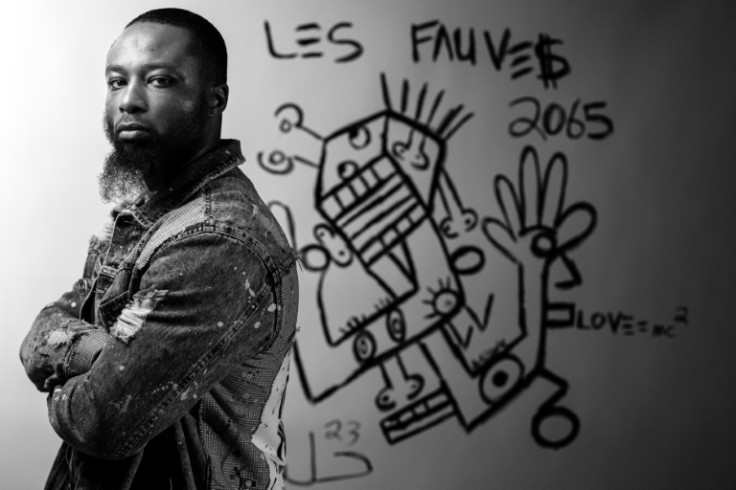The US Artist Who Went From Prison Cell To Paris Show

Aged 16, Halim Flowers was arrested in the United States, tried as an adult then jailed for murder. Now aged 42, he is a prolific artist, poet and writer exhibiting in Paris.
The turnaround has been spectacular.
Flowers was only released in 2019 after a change in US law allowed for under-18s who had been tried as adults to be "re-sentenced".
Then a year later, when Covid-19 pushed much of the world into lockdown, his wife -- also an artist -- suggested he should give painting a go.
"I just took the brush. I had no idea about colour, how mixing red and white made pink. She told me how to do that, how to take care of my brushes," he told AFP.
Visiting AFP's photo studio in Paris, Flowers sketched a graffiti-style drawing on a white background and explained that art was his "only drug".
"I don't smoke drugs, I don't drink alcohol, I don't party. All I do is art," he said.
Colourful and rich in symbolism, his work highlights the experiences of people on the margins -- prisoners, the homeless, those with mental health issues.
The Washington native, who is displaying his paintings until Sunday at the Champop gallery in the French capital, told the United States' National Public Radio in 2021 he had already sold art worth more than $1 million.
His life now is a far cry from that of the skinny teenager who featured in a 1998 documentary for HBO titled "Thug Life in DC".
A disconsolate Flowers told the documentary he had no hope, and that his mother would probably be dead by the time he was freed.
Flowers was raised in a poor neighbourhood of the US capital and grew up during the crack "epidemic".
He fell into drug dealing and eventually got caught up in a robbery that resulted in someone being shot dead.
Despite not being the shooter, he was tried and convicted of murder under the principle of "aiding and abetting".
He said his generation of jailed children were regarded as "super predators" but he knew he was innocent and had enough faith in himself to struggle to show his humanity.
"Those who are considered as beasts and super predators today can become those who visit the museums tomorrow," he said.
After years of campaigning, he was finally freed in early 2019 -- his mother greeting him with open arms.
Already with a track record as an author and poet, he worked with reality TV star Kim Kardashian on a documentary called "The Justice Project", which helped to secure the release of one of his childhood friends.
He met both Kardashian and her then husband, musician Kanye West, although he credits West's fellow rapper Jay-Z with sparking his interest in visual art.
"I was introduced to visual art through listening to Jay-Z rap about Jean-Michel Basquiat," he said, referring to the US artist who shot to fame in the 1980s before dying of a heroin overdose at 27 in 1988.
For Flowers, seeing that a black person had been "received and revered in the art world" was a revelation and inspired him to begin studying the arts while in jail.
The similarity between his work and that of Basquiat has led to accusations he is copying his forebear but Flowers flatly denies the charge.
"To show my reverence to my ancestors through my work is an honour," he said.
"Anything that I do that resembles them is because we share the same spirit."
Now he wants to use his art to change perceptions, particularly about notions of justice.
"I think people are surprised that I came home from prison and I wasn't being bitter or angry," he said.
There's nothing that necessarily links being in jail to being angry and bitter, he stressed.
He sees the issue as a wider one -- society in general, he said, has been infected by a "pandemic of lack of love".
His mission is to create a "new visual language" that will vaccinate against this pandemic and transform our image of justice.
© Copyright AFP {{Year}}. All rights reserved.





















